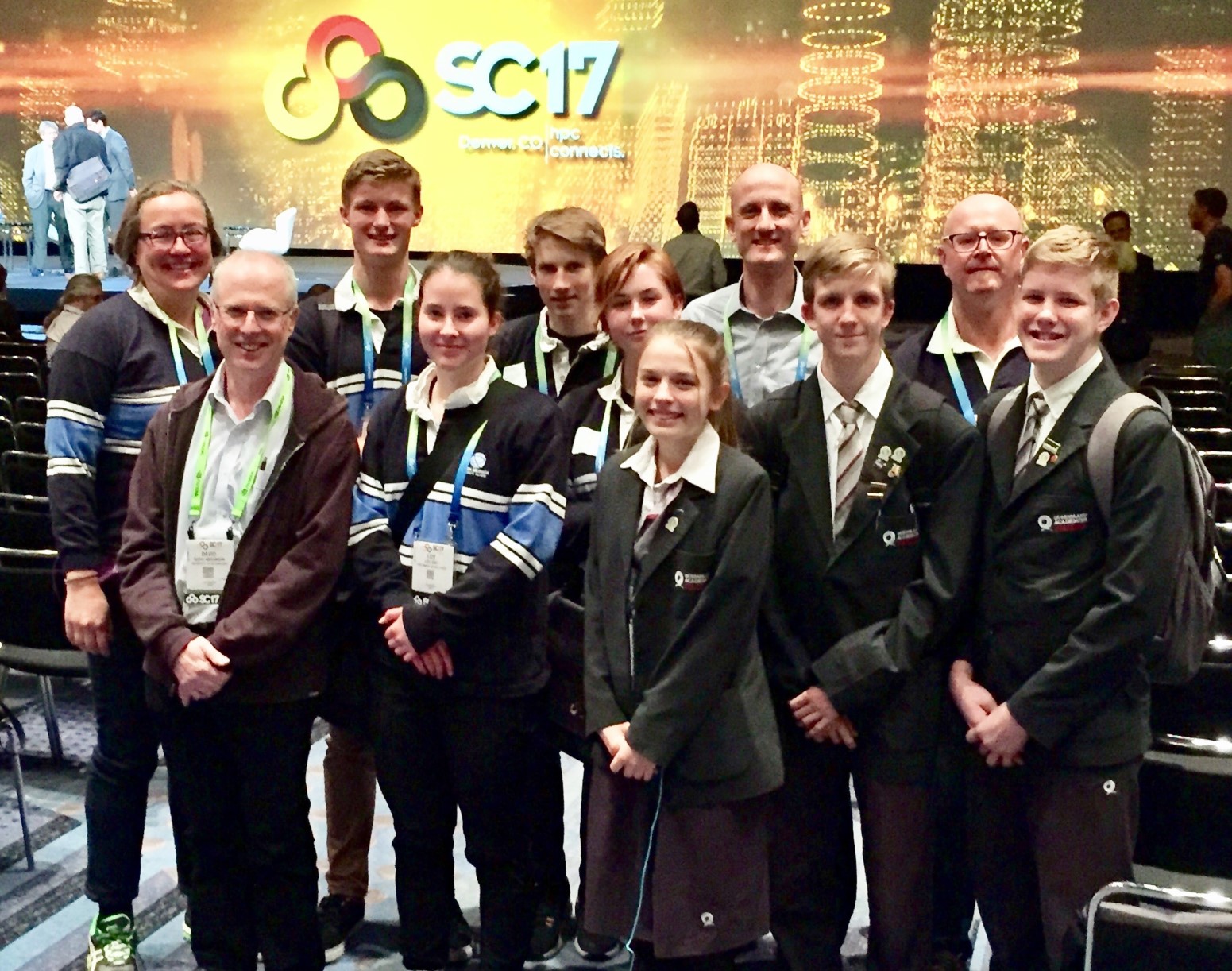
By Prof. David Abramson
I have just attended the 2017 conference on Supercomputing in Denver, U.S.A., held 12–17 November. As usual, this enormous conference, organised by the Association for Computing Machinery (ACM) and Institute of Electrical and Electronics Engineers (IEEE), touches just about every aspect of high performance computing, from applications to software and hardware.
This year, I was accompanied by Jake Carroll from UQ’s Queensland Brain Institute, and Dr Minh Dinh and Dr Hoang Nguyen from RCC.
Minh, Hoang and I all gave talks at the ATIP [Asian Technology Information Program] Workshop on International Exascale and Next-Generation Computing Programs, where we heard updates from various countries on their HPC efforts.
I managed to attend a number of excellent keynote and invited talks. Professor Philip Diamond, Director General of the international Square Kilometer Array (SKA) project and Dr Rosie Bolton, SKA Regional Centre Project Scientist, gave an excellent overview of both the history of astronomy projects, and the SKA in particular at the conference launch. Of course, Australia is a major player in the SKA project, so even though some of the material was known to us, the presentation was excellent.
A highlight of the conference were the talks by the SC award winners. Steve Plimpton from America’s Sandia National Laboratories won the 2017 IEEE Computer Society Sidney Fernbach Award, and gave a delightful talk called "Particles, HPC, and the Ukulele Syndrome”. Here he used the analogy of how hard it is to play a ukelele well to illustrate how difficult it is to program parallel machines. To do this he cited the work of ukelele master Jake Shimabukuro (look up YouTube for some amazing playing). He also outlined the amazing improvement in particle methods over the generations of machines.
Jesus Labarta from the Barcelona Supercomputing Center won the 2017 ACM and IEEE Computer Society Ken Kennedy Award and gave a talk entitled "The Real Revolution … from the Latency to the Throughput Age”.
As the deputy chair of the Test-of-Time Award (ToTA) committee it was great to hear this year’s winner Dr Michael Wolfe give a talk about his seminal research on iteration space tiling. This technique underpins the automatic parallelisation in a number of high performance compilers. (ToTA honours SC papers that have made significant and lasting contributions to the field. I will be the chair of the ToTA committee for the 2018 conference).
Dr Paul Messina gave a nice talk on the U.S. Department of Energy Exascale Computing Project. Having watched this program as an outsider for a number of years, it is clear that there is progress towards not only an exascale machine, but also the necessary applications. There is a big focus on co-design in which applications are developed alongside the hardware and software systems to make sure that the two converge.
Gordon Bell spoke about the 30 years of the Gordon Bell Prize, an award he started to encourage the development of parallel applications. This candid ramble through the history of supercomputers was heart-warming, especially to those of us old enough to have seen many of the machines.
I really enjoyed a talk by my friend Professor Rommie Amaro from the University of California, San Diego on Molecular Simulation at the Mesosale, in which she spoke of the significant progress in molecular simulations that are enabled by modern HPC machines. I also enjoyed a talk by Catherine Graves from Hewlett Packard Enterprise on neural network classification with the Dot Product Engine. This machine uses Memrister devices to enable analogue computing, and is certainly a new face to a very old paradigm.
On top of that, I attended quite a few vendor sessions and a meeting of the NCSA International Affiliates. The NCSA is the National Center for Supercomputing Applications based at the University of Illinois at Urbana-Champaign. We sent some UQ students to NCSA a few years ago, and we discussed restarting that exchange.
As in previous years, there was a contingent of students from Melbourne’s John Monash Science School (JMSS) and the Queensland Academy for Science, Mathematics and Technology (QASMT) at SC. RCC again sponsored the QASMT students to attend, and they will share what they learned with their fellow students. There is something very exciting about hearing high school students talking about quantum computing and the applications of supercomputers, and I am sure we will see great outcomes from them in coming years. [Read the related RCC News article titled "Beyond SC17: How RCC-sponsored high school students further their learning".]
Overall, SC17 was a great meeting.



